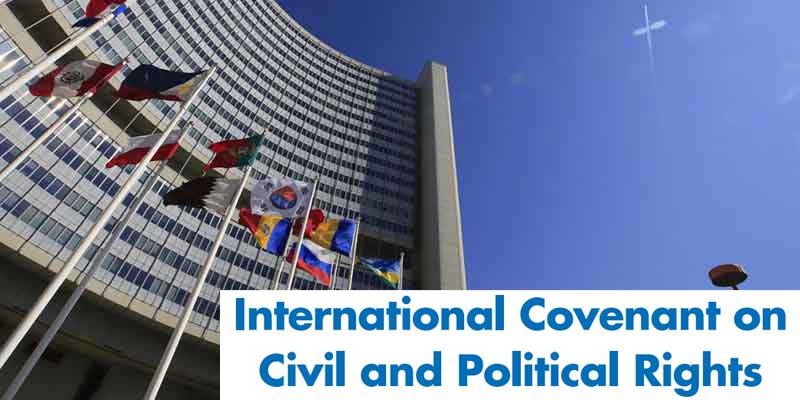- India
- Jul 19
Explainer - International Covenant on Civil and Political Rights (ICCPR)
• A periodic review of India’s implementation of the UN-mandated International Covenant on Civil and Political Rights (ICCPR) was successfully concluded by experts of the Human Rights Committee in Geneva.
• The ICCPR, adopted by the UN General Assembly in 1966, is a multilateral treaty that commits nations to respect the civil and political rights of individuals. It came into force in 1976.
• India became a state party to ICCPR in 1979.
• The Human Rights Committee, comprising 18 independent experts serving in their individual capacity, monitors implementation of ICCPR and reviews reports of all countries by conducting periodic reviews, and then making observations and recommendations.
• India has undergone three ICCPR reviews in the past, the last being in 1997.
• The fourth periodic review of India, which took place on July 15-16, saw the Indian delegation engaging in constructive dialogue with the members of the Human Rights Committee on a wide range of issues related to civil and political rights.
• The Ministry of External Affairs (MEA) said the review demonstrated India’s commitment to engaging with the international human rights framework and its willingness to address concerns, while continuing its efforts towards protection and promotion of the rights of its citizens.
• The rights and freedoms provided in ICCPR are guaranteed under the Constitution of India as well as our legislative and judicial framework.
International Covenant on Civil and Political Rights (ICCPR)
• Following World War II, a series of declarations and covenants began to articulate universal human rights.
• In 1948, for the first time, countries agreed on a comprehensive list of inalienable human rights. In December of that year, the United Nations General Assembly adopted the Universal Declaration of Human Rights (UDHR), a milestone that would profoundly influence the development of international human rights law.
In December 1966, the UN General Assembly adopted two international treaties that would further shape international human rights:
i) The International Covenant on Economic Social and Cultural Rights (ICESCR)
ii) The International Covenant on Civil and Political Rights (ICCPR).
• These are often referred to as ‘the International Covenants’.
• Together, the UDHR and these two Covenants are known as the International Bill of Human Rights.
• The Human Rights Committee monitors the ICCPR.
• The Committee on Economic, Social and Cultural Rights monitors the ICESCR.
• The International Covenant on Civil and Political Rights (ICCPR) was adopted and opened for signature, ratification and accession by General Assembly resolution on December 16, 1966.
• It took another 10 years before the necessary 35 States had become parties to it and it formally entered into force for those States on March 23, 1976,
• It sets out a system by which the Human Rights Committee can receive and consider complaints from individuals who allege that their human rights have been violated.
• As its name makes clear, the Protocol is not compulsory, but once a State party to the Covenant also becomes a party to the Protocol, any person subject to the jurisdiction of the State party may lodge a written complaint with the Human Rights Committee.
The ICCPR aims to ensure the protection of civil and political rights including:
• Freedom from discrimination
• Right to equality between men and women
• Right to life
• Freedom from torture
• Freedom from slavery
• Right to liberty and security of person
• Right to be treated with humanity in detention
• Freedom of movement
• Freedom of non-citizens from arbitrary expulsion
• Right to fair trial
• Right to recognition before the law
• Right to privacy
• Freedom of religion and belief
• Freedom of expression
• Right of peaceful assembly
• Freedom of association
• Right to marry and found a family
• Right of children to birth registration and a nationality
• Right to participate in public affairs
• Right to equality before the law
• Minority rights.
ICCPR has been supplemented by two Optional Protocols:
i) The first Optional Protocol, which gave the Committee the competence to examine individual complaints with regard to alleged violations of the rights enshrined in the Covenant.
ii) The Second Optional Protocol aiming at the abolition of the death penalty.
Human Rights Committee
• The Human Rights Committee is the body of 18 independent experts that monitors implementation of the International Covenant on Civil and Political Rights by its State parties.
• All States parties are obliged to submit regular reports to the Committee on how civil and political rights are being implemented.
• States must report initially one year after acceding to the Covenant and then whenever the Committee requests.
• In accordance with the Predictable Review Cycle, the Committee requests the submission of the report based on an eight-year calendar.
• The Committee examines each report and addresses its concerns and recommendations to the State party in the form of ‘concluding observations’.
• The Committee meets in Geneva and normally holds three sessions per year.
• One of the great strengths of the Committee is the moral authority it derives from the fact that its membership represents all parts of the world. Instead of representing a single geographical or national perspective, the Committee speaks with a global voice.
Manorama Yearbook app is now available on Google Play Store and iOS App Store

